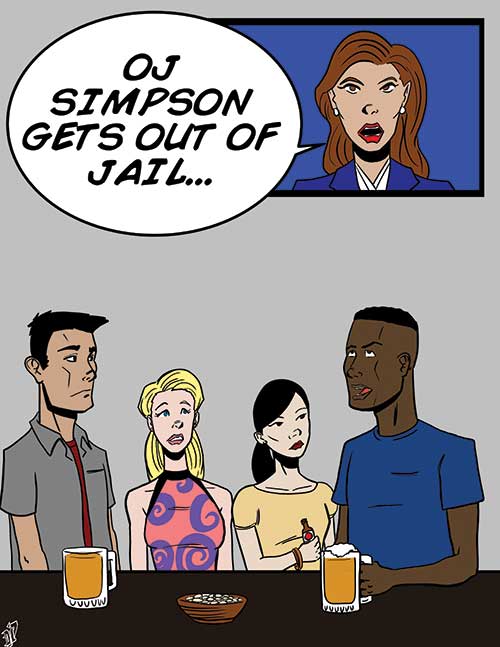O.J.’s nine-year sentence a product of racially-influenced judicial system

Those who think that O.J. Simpson got away with murdering his wife Nicole in 1995 were not pleased when he was paroled two weeks ago from state prison in Nevada. He had served nine years for armed robbery and other felonies. Strong personal attitudes often becloud the standard of objective justice.
During the period that Simpson served his time in Nevada, numerous unarmed blacks were killed by police in jurisdictions around the country. While Simpson was in prison, Tashii Brown, a black man who was unarmed and non-threatening, was killed with a choke hold by a police officer in Las Vegas.
Last June a jury failed to convict a white police officer for fatally shooting Sam Dubose, who was stopped in Cincinnati, Ohio for an alleged broken tail light. A jury recently acquitted a Minnesota police officer for shooting Philando Castile, whose car was stopped for a traffic violation in St. Paul.
Police officers have walked away from a number of trials in which they have been criminally charged with killing unarmed black citizens. They have not served a day in jail, yet there has been no public protest comparable to the uproar in opposition to the vindication of Simpson, who was charged with first-degree murder. The evidence did not support conviction, so he was acquitted, as the law requires.
The conduct of Mark Fuhrman, one of the detectives, was so egregious that many blacks believed Simpson was framed, while many whites were irate that a black man had beaten the system. Simpson was later convicted of several felony charges in Nevada in 2008, exactly 13 years to the day after his acquittal in the murder case.
Of course the prosecutors would deny that there was any connection between the two cases, but such extreme charges against Simpson seem excessive. He is charged with armed robbery and kidnapping, very serious offenses until one reviews the facts.
When in Las Vegas to attend a wedding, Simpson was told that a sports memorabilia dealer was selling items that had been stolen from him. So Simpson, along with several friends, went to the dealer’s hotel room to recover his property. Taking the property with a show of force technically constitutes robbery. Since at least one of Simpson’s companions was armed, that constitutes armed robbery, and since the dealer was not permitted to leave until Simpson had recovered his property, that constitutes kidnapping.
No shots were fired and no one was injured. The inventory of the memorabilia dealer did include numerous items that were the personal property of Simpson and had been improperly taken from him. However, that is not to conclude that the dealer had stolen Simpson’s goods.
It is hard to believe that an appropriate sentence for such an offense is nine to 33 years. The heart of the case is an awkward and impolitic attempt to reclaim one’s own property, which is up for sale and very well might never otherwise be recovered. Undoubtedly the scion of a well-to-do white family would not be subjected to such a harsh penalty.
The purpose of the law is to achieve justice and equality for all, but it is often used as a cudgel to maintain white supremacy.






